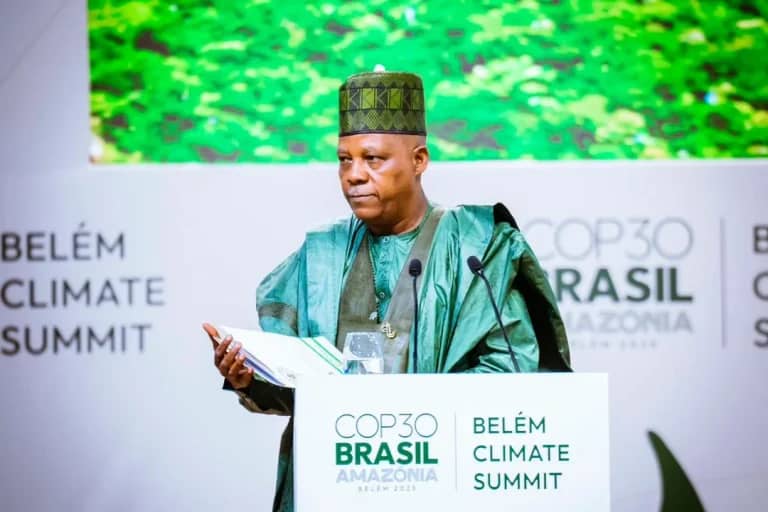At the ongoing United Nations Climate Change Conference (COP30) in Belem, Brazil, Vice President Kashim Shettima called on the international community to significantly scale up funding for nature protection and restoration. Representing President Bola Tinubu at a high-level session titled “Climate and Nature: Forests and Oceans”, Shettima emphasized the need for predictable, equitable, and accessible financing to safeguard forests, landscapes, and oceans—resources that transcend national borders.

Shettima highlighted that nature, often treated as a commodity rather than an investment, is one of the world’s most critical infrastructures. “Nigeria is committed to integrating nature-positive investments into its climate finance framework,” he said. Through the National Carbon Market Framework and Climate Change Fund, Nigeria aims to mobilize up to $3 billion annually to support community-led reforestation, blue carbon projects, and sustainable agriculture.
The Vice President stressed that the countries of the Global South, which contributed least to the climate crisis, are bearing its heaviest costs. For climate justice to be meaningful, nations historically benefiting from resource extraction must now lead restoration efforts. He urged the international community to expand grant-based financing, operationalize Blue Carbon Markets, and implement debt-for-nature swaps to enable developing countries to invest in conservation.
“We call on global partners to channel significant finance towards protecting and restoring nature through predictable, equitable, and accessible mechanisms,” Shettima said, adding that indigenous peoples, farmers, and fisherfolk should be rewarded for their stewardship rather than displaced by it.

Shettima noted that countries ignoring forests and oceans have always faced consequences, which is why Nigeria is taking a proactive role in global discussions on ecological stability. Within the country, challenges such as deforestation, desertification, illegal mining, coastal erosion, and rising sea levels are already threatening communities and livelihoods.
Under Nigeria’s Climate Change Act 2021, nature-based solutions are a legal obligation, and the government is implementing coordinated measures to restore balance between climate, nature, and development. Initiatives include the Great Green Wall project, reforesting degraded lands across eleven states, planting over ten million trees, and creating thousands of green jobs for youth and women. Through the National Afforestation Programme and Forest Landscape Restoration Plan, Nigeria plans to restore more than two million hectares of degraded land by 2030. The Marine and Blue Economy Policy also aims to sustainably harness the country’s ocean resources, promoting climate-smart fisheries, coastal protection, and marine biodiversity conservation.
Shettima reaffirmed Nigeria’s commitment to global partnerships in aligning climate action with nature restoration and human prosperity. He rejected narratives portraying Africa solely as a climate victim, highlighting the continent’s rainforests, mangroves, peatlands, and oceans as major untapped carbon sinks and young Africans as key sources of innovation and solutions.

“Nigeria believes COP30 should launch a new compact recognizing Africa’s ecosystems as global assets deserving investment and protection. We invite partners to join Nigeria and the African Union in advancing the African Nature Finance Framework, unlocking private capital for reforestation, ecosystem restoration, and blue economy development across the continent,” he concluded.



